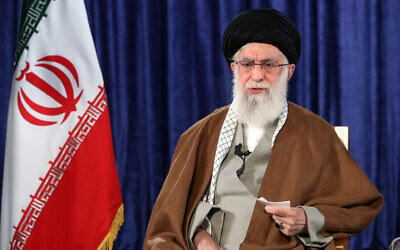White House Blasts ‘Appalling’ Twitter Policy on Khamenei’s Anti-Israel Posts
Press secretary pans social media company’s reluctance to label Iranian leader’s calls for Jewish state’s destruction, while it repeatedly applies warnings to Trump tweets.

The White House on Friday blasted Twitter for allowing tweets by Iran’s supreme leader calling for Israel’s destruction to be posted without censorship, with Press Secretary Kayleigh McEnany saying the social media company’s police was “appalling.”
The social media giant’s policy vis-a-vis tweets by Ayatollah Ali Khamenei has been making headlines this week after officials reiterated that his calls for Israel’s destruction did not violate the company’s rules against hate speech as they are considered mere “foreign policy saber rattling.”
Twitter’s Vice President of Public Policy Sinéad McSweeney replied by saying that, “World leaders use Twitter to engage in discourse with each other, as well as their constituents… Presently, our policies with regards to world leaders state that direct interactions with fellow public figures, comments on current affairs, or strident statements of foreign policy on economic or military issues are generally not in violation of the Twitter Rules.”
On Wednesday, a Twitter official on Wednesday told the Israeli Knesset that such tweets by Ayatollah Ali Khamenei do not violate the company’s rules against hate speech, and indicated that they are considered mere “foreign policy saber-rattling.”
“I thought it was very eye opening and it tells you where these social media companies stand, where they’re not willing to assess the Ayatollah Khomeini’s tweets but they are willing to assess President Trump’s tweets,” McEnany said.
“It’s really appalling and it just speaks to their overwhelming, blinding bias against conservatives and against this president,” she added.
McEnany noted that the administration was seeking to take action, submitting a petition to the Federal Communications Commission “to hold social media companies accountable for their censorship” by making them liable to “civil lawsuits for their own speech, fact checks and de-platforming.”
Ylwa Pettersson, Twitter’s head policy for the Nordic countries and Israel, told the Knesset’s Committee for Immigration, Absorption and Diaspora Affairs, via video-conference Wednesday: “We have an approach toward leaders that says that direct interactions with fellow public figures, comments on political issues of the day, or foreign policy saber-rattling on military-economic issues are generally not in violation of our rules.”
She was responding to a question by pro-Israel activist Arsen Ostrovsky, who had asked why Twitter attached a special label to a recent tweet by Trump noting that it violated the company’s rules, while the Iranian leaders’ many tweets about his wish for Israel to be destroyed are left untouched.
On May 29, Twitter for the first time attached a warning label to Trump’s tweet about the riots that broke out in the US following the killing of George Floyd.
“I just want to fine-tune [Ostrovsky’s] question: Calling for genocide on Twitter is okay, but commenting on the political situation in certain countries is not okay?” asked MK Michal Cotler-Wunsh, who was leading the discussion.
I kid you not! At Knesset hearing on Antisemitism, @Twitter rep tells me they flag @realDonaldTrump because it serves ‘public conversation’, but not Iran’s @khamenei_ir call for GENOCIDE, which passes for acceptable ‘commentary on political issues of the day’. cc. @CotlerWunsh pic.twitter.com/AXwjkrvlql
— Arsen Ostrovsky (@Ostrov_A) July 29, 2020
“If a world leader violates our rules but there is a clear interest in keeping that up on the service we may place it behind a notice that provides some more context about the violation and allows people to click through if they wish to see that type of content,” Pettersson replied.

“That’s what happened for the Trump tweet: that tweet was violating our policies regarding the glorification of violence based on the historical context of the last line of that tweet and the risk that it could possibly inspire harm and similar actions.”
Trump’s May 29 tweet ended with the words: “Any difficulty and we will assume control but, when the looting starts, the shooting starts. Thank you!”
In addition to the warning label, Twitter disabled the public’s ability to “like” the post, but decided not to remove it “so the citizens can see what their political figures are commenting [on] and hold them accountable for it online,” said Pettersson, who spoke to the Knesset meeting via Zoom.
Pettersson did not comment specifically about the incendiary tweets by the Iranian leader.
“Wow. Twitter just admitted that tweets calling for genocide against Jews by Iranian leaders DON’T violate its policy!” Cotler-Wunsh tweeted after the session ended. “This is a double standard. This is anti-Semitism.”
Last month, The Times of Israel provided Twitter with several examples of Khamenei urging Israel’s elimination, including an explicit call for “armed resistance” — terrorism — against Israel, asking why these tweets do not violate the company’s official guidelines on world leaders, which include a ban on the promotion of terrorism.
According to Twitter’s rules on terrorism and violent extremism, “there is no place on Twitter for… individuals who affiliate with and promote [terrorist group’s] illicit activities… Our assessments in this context are informed by national and international terrorism designations.”
The elimination of the Zionist regime does not mean the massacre of the Jewish ppl. The ppl of Palestine should hold a referendum. Any political sys they vote for should govern in all of Palestine. The only remedy until the removal of the Zionist regime is firm, armed resistance.
— Khamenei.ir (@khamenei_ir) May 21, 2020
We will support and assist any nation or any group anywhere who opposes and fights the Zionist regime, and we do not hesitate to say this.#FlyTheFlag
— Khamenei.ir (@khamenei_ir) May 20, 2020
The West Bank must be armed, just as Gaza. The only thing that can reduce the Palestinians’ hardships is the hand of power. Otherwise, compromise won’t reduce a bit of the cruelty of this usurping, evil, wolf-like entity.#FlyTheFlag
— Khamenei.ir (@khamenei_ir) May 18, 2020
A spokesperson for Twitter replied to The Times of Israel by saying these tweets “are not in violation of our policies at this time,” pointing to the company’s policy according to which “foreign policy saber-rattling on economic or military issues are generally not in violation of the Twitter Rules.”
The Islamic Republic of Iran, whose leadership routinely advocates the elimination of Israel, is considered a leading state sponsor of terror, which openly and proudly supports groups such as Hamas, Palestinian Islamic Jihad and Hezbollah, all of which seek to eradicate Israel via terrorist means. In April 2019, the US designated Iran’s own Islamic Revolutionary Guards Corps as a foreign terrorist organization.
Why should & how can #Israel be eliminated? Ayatollah Khamenei’s answer to 9 key questions.#HandsOffAlAqsa pic.twitter.com/IVPOuNfMQH
— Khamenei.ir (@khamenei_ir) November 9, 2014
In 2014, Khamenei posted on his twitter account a nine-point plan explicitly proposing the elimination of Israel.
At Wednesday’s Knesset debate, Cotler-Wunsh, MKs and pro-Israel advocates urged Twitter to do more to protect Israelis and Jews worldwide from anti-Semitic hate speech.
Yogev Karasenty, who is responsible for the fight against anti-Semitism at the Diaspora Affairs Ministry, said some 200,000 anti-Semitic tweets were found on Twitter in the past two months.
There has recently been significant improvement in how social networks deal with the anti-Jewish material, “but it’s not enough,” lamented Yaakov Hagoel, the vice chair of the World Zionist Organization. Posts that target Muslims or the LGBT community are removed promptly, but when it comes to anti-Semitic posts, “they dodge, ignore and drag their feet,” he said.
Cotler-Wunsh, a freshman lawmaker from the Blue and White party, said that Israel does not necessarily expect Twitter to delete anti-Semitic posts but rather to attach labels to them explaining to users why they are problematic.

“I’m not making the case for removing all content. I would suggest flagging the context as anti-Semitic. I believe there is a lot more learning that can be done this way,” she said.
She also called on Twitter to implement the working definition of anti-Semitism formulated by the International Holocaust Remembrance Alliance (IHRA), which has recently been adapted by many countries, and which considers certain forms of anti-Israel agitation to be anti-Semitic.
“We are already using the IHRA working definition when we do develop our policies and internal documents we train our content operators with. So we’re aware of it and are using it,” Twitter’s Pettersson replied.
Raphael Ahren contributed to this report.




comments